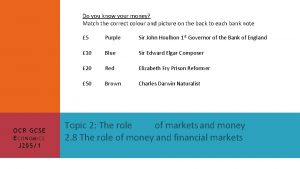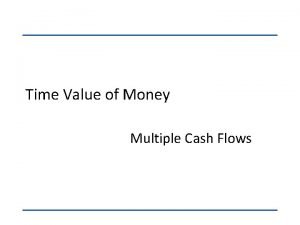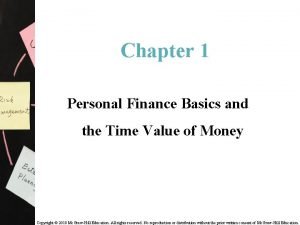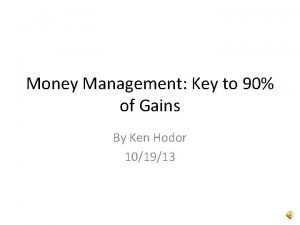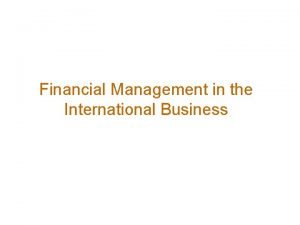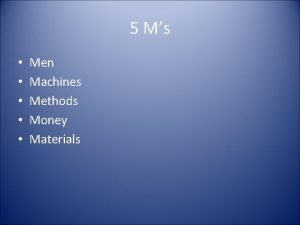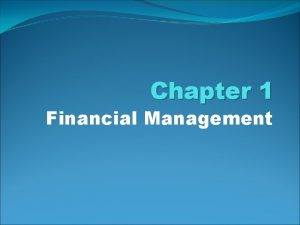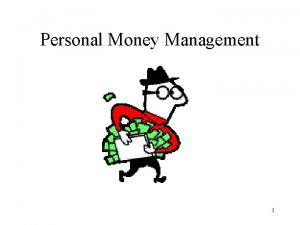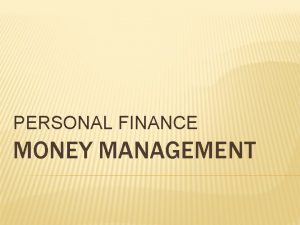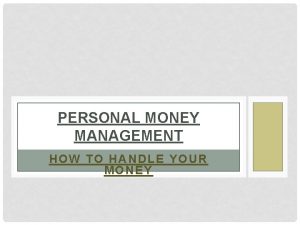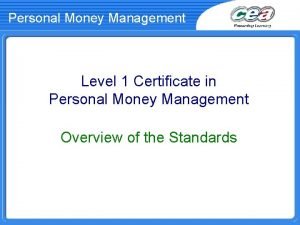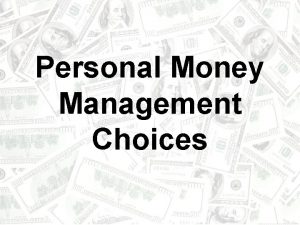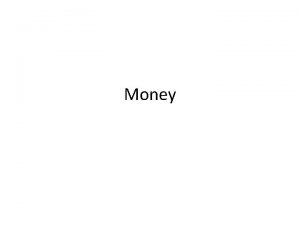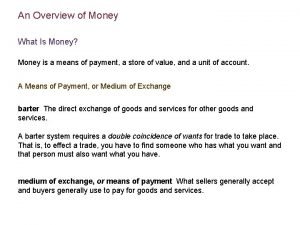Personal Money Management Personal Money Management Personal money










- Slides: 10

Personal Money Management

Personal Money Management • Personal money management begins with income. • It is important to save a portion of earned income for future purchases. • A budget is a plan for the expected earned income and expected expenses. • When consumers borrow money from the bank, they take on debt that must be paid back along with interest. • Responsible money management involves budgeting, saving, goal setting, and making wise decisions about debt.

Income & Expenses • Income is payment for doing work • It may also come from gifts or from selling things • Net income is the total amount of money that a worker takes home after taxes are withheld • To manage money effectively, income should always be higher than expenses • An expense is the cost of something purchased

Household Budgeting • A budget is a plan for spending and saving income • The main reason people keep a budget is to track how much money they have available to spend & save. • Benefits of a budget: • Plan expenses • Control wasteful & impulsive spending • Maintain control of personal finances • Plan for long-term and short-term goals

Creating a Budget • Basic rule to remember: Income must always be higher than expenses. • Once a budget is set up, it can be adjusted as needed. • Steps in setting up a budget • Estimate the amount of income expected each month • Estimate the expenses expected each month (bills, subscriptions) • Consider short-term & long-term goals when deciding how much to save • Balance the budget each month by comparing the amount of income to the amount of expenses

Budget Examples

Saving Money • Saving money allows people to plan for future purchases, grows over time, and can be used in the case of an emergency • By saving money in a bank or savings institution, money can earn interest, which is a charge the bank pays the account holder for the use of their money • An account holder can get their money at any time, but the bank will use the money while it is in the account loans to other account holders • Interest amounts can range from. 05% up to 14% • Interest rates at banks are based on the prime lending rate which is set by the Federal Reserve which is the bank of the United States • When unemployment becomes high, or the economy needs to be stimulated, the “Fed” will lower the prime rates

Credit and Debt • Credit is an arrangement for deferred payment of a loan or purchase • Take now, pay later with interest added • Debt is the sum of the money owed • Includes the amount borrowed plus the interest accrued • It is important to borrow money only when it is absolutely necessary, and to pay back borrowed money as soon as possible. Balance Owed 10% Interest Charge $100 borrowed in January $10 $110 owed in February $11 $121 owed in March $12. 10 $133 owed in August $13. 31

Credit Card Debt • First, understand the difference between a credit card & debit card • Credit Card – you spend money you may not have now to purchase something you will pay for later, with interest applied • Debit Card – you are paying money directly from your bank account for a item • The most common reason for the use of credit cards is when consumers find themselves in a position where their expenses are higher than their income • Using credit cards for a short-term issue seems like a good idea, but can cause problems in the long-term • Interest on most credit cards is around 19% (can be higher or lower) • Interest rates can fluctuate whenever the “Fed” adjusts the prime lending rate • Charlie makes a $2000 purchase on their Visa Card. • With an interest rate of 19%, they will accrue $400 in interest charges • Every month they do not pay off the balance, another 19% of the balance will added to the total amount owed • This is called compounding interest

Responsible Personal Finance • The key to responsible personal finance is never borrow more money than you can repay in a reasonable amount of time. • Borrowers must understand that there is an associated risk with debt: • Poor debt management can lead to other financial problems such as bankruptcy, or difficulty receiving credit in the future Learning to control and understand personal finance is an important task for everyone to learn!


